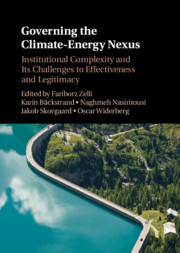Governing the Climate-Energy Nexus
Combating climate change and transitioning to fossil-free energy are two central and interdependent challenges facing humanity today. Governing the nexus of these challenges is complex, and includes multiple intergovernmental and transnational institutions. This book analyzes the governance interactions between such institutions and explores their consequences for legitimacy and effectiveness. Using a novel analytical framework, the contributors examine three policy fields: renewable energy, fossil fuel subsidy reform, and carbon pricing. These fields are compared in terms of their institutional memberships, governance functions, and overarching norms. Bringing together prominent researchers from political science and international relations, the book offers an essential resource for future research and provides policy recommendations for effective and legitimate governance of the climate-energy nexus. Rooted in the most recent research, it is an invaluable reference for researchers, policy makers, and other stakeholders in climate change and energy politics.
Fariborz Zelli is an associate professor in the Department of Political Science at Lund University. He is also a principal investigator and board member at BECC (Biodiversity and Ecosystem Services in a Changing Climate). His research focuses on international institutions, global environmental governance, and political theory and philosophy. He has edited four volumes: Environmental Politics and Governance in the Anthropocene (Routledge, 2016); Encyclopedia of Global Environmental Governance and Politics (Elgar, 2015); a special issue with Global Environmental Politics (2013); and Global Climate Governance beyond 2012 (Cambridge University Press, 2010).
Karin Bäckstrand is a professor in environmental social science in the Department of Political Science at Stockholm University, where she codirects the Environmental Policy, Politics, and Learning (EPPLE) research group. Her primary research revolves around global environmental politics, the role of science in environmental decision making, the politics of climate change, and the democratic legitimacy of global governance. Her papers have been published in Global Environmental Politics, European Journal of International Relations, and Global Environmental Change. Her recent books are The Research Handbook on Climate Governance (Elgar, 2015) and Rethinking the Green State (Routledge, 2015).
Naghmeh Nasiritousi is a postdoctoral research fellow at Stockholm University. Her research focuses on international climate change politics, energy governance, and issues of legitimacy and effectiveness. Her research has been published in journals such as Nature Climate Change, European Journal of International Relations, International Studies Quarterly, Global Environmental Politics, International Environmental Agreements: Politics, Law, and Economics, and Annual Review of Political Science.
Jakob Skovgaard is an associate professor at Lund University and a principal investigator at BECC (Biodiversity and Ecosystem services in a Changing Climate). His research focuses on national, EU, and international climate politics – including the interactions between these levels and between economic and environmental objectives. He is coeditor of The Politics of Fossil Fuel Subsidies and Their Reform (Cambridge University Press, 2018) and of a special issue with International Environmental Agreements: Politics, Law and Economics (2017).
Oscar Widerberg is an assistant professor at the Institute for Environmental Studies (IVM), Free University of Amsterdam. His teaching and research focus on international and transnational governance for climate change, biodiversity, and sustainability. He holds a PhD from the Free University of Amsterdam. Before joining academia, he worked in international public policy consulting.



